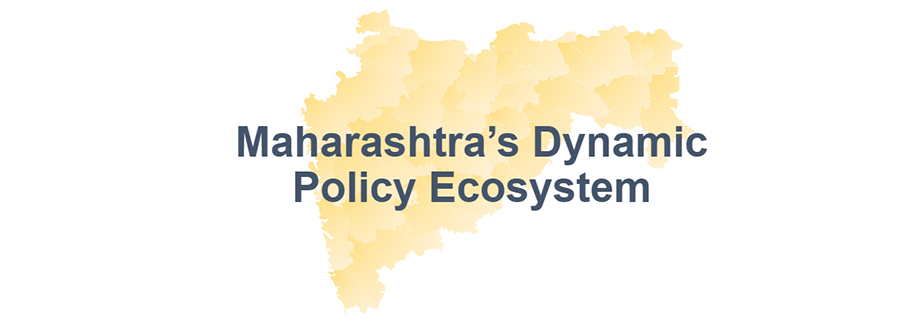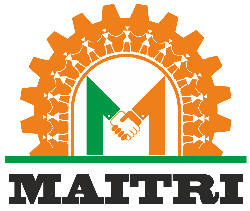Policies

-
Maharashtra IndustrialPolicy 2019
Maharashtra has formulated industry and sector specific policies and consistently updates its incentives and offering to align with the evolving global economic dynamics and business scenarios
Maharashtra Industrial Policy 2019
Policy Targets
- Attain manufacturing sector growth rate of 12% to 13%
to reach GSDP share of 25% by 2023-24. - Attract investments of INR 10 lakh crore by 2023-24.
- Create employment opportunities for 40 lakh people by 2023-24.

Key Highlights
- Industrial Promotion Subsidy: LSI – Reimbursement of 50%of Gross SGST paid on first sale of eligible products in the state; Special LSI – 40% of Net SGST; MSME – 100% of Gross SGST.
- Fixed Capital Rebate: 20% additional fiscal assistance and 2 -year additional eligibility period to Thrust sector units eligible for Industrial Promotion Subsidy (IPS).
- Land Cost Rebate and Stamp Duty Exemption for new / expansion units.
- Customized incentives for mega / ultra mega projects.
- 5% interest subsidy on loans for capital investment obtained from
banks and financial institutions.
- Attain manufacturing sector growth rate of 12% to 13%
-
Package Scheme of Incentives 2019
Package Scheme of Incentives 2019
Fiscal Incentives
Qualification Criteria
Ultra Mega & Mega Projects Project Classification Area Classification FCI (INR Cr.) Minimum Direct Employment Ultra Mega Industrial Unit Entire State 4000 4000 Mega Industrial Unit A & B 1500 2000 C 1000 1500 D 750 1000 D+ 500 750 VMRSD# 350 500 NID, NAA, AD 200 350 
Policy Highlights
- 100% Captive Process Vendor (CPV) investment to be considered as part of admissible
FCI - HPC to recommend customized Package of Incentives on case-to-case basis
- Projects of Special Importance (may or may not be Mega/Ultra-Mega projects) may
get customized package of incentives on case-to-case basis via HPC - Allocation of MIDC land to on priority basis
Large Scale Industries (LSI) Area Classification Min FCI (INR crore) Minimum Direct Employment Max as & of FCI Incentive period (Yr) A & B (Only LSI) 750 1000 25% 7 C 500 750 40% 7 D 250 500 60% 7 D+ 150 400 70% 7 VMRSD# 100 300 80% 9 NIA, NAA, AD 100 250 100% 9 - Investment Promotion Subsidy on Gross SGST paid by units
- 100% stamp duty Exemption in C,D,D+, Talukas, Aspirational Districts, NID regions
and in A, B region only for BT manufacturing and IT parks in Public (100%) and Private
(75%) - LSI units in Food Processing, Green Energy and Industry 4.0 get additional fiscal
support - Thrust sectors to get additional incentives
- Incentives to promote quality competitiveness, R&D, technology up-gradation, water
& energy conservation, cleaner production and credit rating
MSME Area Classification Max FCI Ceiling as % of FCI Eligibility Period (Yrs) A MSME shall include units as per the MSMED Act, 2006, as well as the units with FCI
of upto INR 50 crore– – B 30% 7 C 40% 7 D 50% 10 D+ 60% 10 VMRSD# 80% 10 NIA, NAA, AD 100% 10 - In new MIDC industrial estates, 20% area to be reserved for MSMEs; up to 100% stamp
duty exemption. - Electricity duty exemption for Eligibility period; IPS on Gross SGST paid by the
units. - Power tariff subsidy (except A zone) to an extend of Rs 1 per unit for 3 years.
- MSMEs in Food Processing, Green Energy and Industry 4.0, will get additional fiscal
support. - Fiscal assistance to SC/ST/women entrepreneurs
- 100% Captive Process Vendor (CPV) investment to be considered as part of admissible
-
Maharashtra Logistics Policy 2024
Policy Targets

- Development of more than 10,000 acres of dedicated logistics infrastructure.
- Attract investments of INR 30,000 crores and generate 5,00,000 new job opportunities by 2029.
Key Highlights
- Logistics Masterplan: Development of 1 International Logistics Hub, 1 National Logistics Hub, 5 State Logistics Hubs, 5 Regional Logistics Hubs and 25 District Logistics Nodes.
- Incentives for Logistics Parks and Integrated Truck Terminals: Special Capital Incentives, Critical Infrastructure Support, Additional FSI, Support to Green Logistics, Power at Industrial Rate, Relaxation on Zone Restrictions and others.
- Incentives for MSMEs (Storage and Cargo Handling Units): Interest Subsidy, Stamp Duty Exemption, Technology Upgradation assistance
- Incentives for other units in logistics services: Power at Industrial Rate, Additional FSI.
-
Maharashtra Thrust Sector Policy 2024
Policy Objective

Promotion/incentivizing 10 anchor units in identified Thrust Sectors:
- Semiconductor, Display for LCD & LED, Mobile display & related glass manufacturing, Laptop, computer & servers
- Cells for storage of air Battery (lithium Ion/lithium Titanium oxide/hydrogen fuel cell/ACC, etc products
- Solar panel, modutivesle & cell manufacturing
- Pharmaceutical, Chemicals, Polymers & other related products
- Aerospace & Defence
Eligibility Criteria – Anchor Units
- INR 10,000 crs FCI and employment of at least 4,000 people (direct and indirect basis)
- Investment period cannot exceed 10 years and INR 4,000 crs mandatorily to be invested in first 5 years.
- Following Atmanirbhar bharat’s objective of increased localized production by reducing import dependence.
Key Highlights
- Government assistance (incentives) shall be provided to 2 projects in each of the 5 identified thrust areas (one of the 2 projects shall be at industrially backward areas as defined in PSI, 2019).
- Key incentives Offered: Industrial Promotion Subsidy (100% reimbursement of gross SGST); 100% stamp duty waiver; Electricity duty waiver (15 years); 50% refund of EPF (10 years); Interest rate subsidy (4% p.a. for 10 years); Electricity rate concession; Concessional rate of plots at MIDC and MITL areas
-
Maharashtra Green Hydrogen Policy 2023
Policy Objectives
- Optimum use of available renewable energy sources instead of fossil fuels resulting in enhanced energy security and promoting clean energy.
- Promotion of export of green fuel and equipment required for production of green hydrogen.
- To promote the production of electrolysers in the state.
- Promoting investment in the emerging hydrogen and renewable energy sectors, increasing employment opportunities resulting into increased state’s economy.
- Promotion of R&D in electrolysers and fuel cells and making Maharashtra a leading state in manufacturing.

Incentives – Anchor Units
-
First 3 anchor units:
- 30% capital subsidy for setting up new plant
- 20% concession in wheeling and transmission charges for 20 years
- 100% subsidy on electricity duty for 15 units
Other Key Incentives
- Incentives for Hydrogen Vehicles: 30% capital subsidy for first 500 hydrogen-based fuel cell passenger vehicles.
- Incentives for renewable energy projects: Farm taxes and non-agricultural taxes are waived for solar and wind projects & 100% stamp duty exemption for land use
Policy Targets
- To make Maharashtra a leader in the green hydrogen with a production target of 500 kilo tons per annum green energy by 2030.
- Promotion of decarbonisation in energy intensive industries as well as heavy industries as a source of raw material to accelerate the development and use of derivatives.
-
Maharashtra State Export Promotion Policy 2023
Policy Objectives
- To double the exports from Maharashtra to reach US $150 Bn by FY 2027-28 from the current value of US $72 Bn in FY 2022-23.
- To develop 30 World Standard Export Oriented Industrial Parks in Maharashtra in next 5 years.
- To achieve 22% of total state participation in country’s $ 1 trillion export target by 2030.

Key Highlights
- Creation and strengthening of export promoting infrastructure and facilities.
- Exclusive incentives for exporters and export-oriented units (EOUs).
- Promotion of One District One Product (ODOP) and Geographical Indication (GI) products.
- Eligible industry sectors in Policy: High Efficiency Solar PV Modules, White Goods (ACs & LEDs), Automobile & Auto Components, Medical Devices, Textile, Electronics, Speciality Steel, Drones, Pharmaceuticals
- Key incentives include stamp duty exemption, interest subsidy, electricity duty exemption, SGST refund, etc.
-
Integrated and Sustainable Textile Policy 2023
Policy Vision
- Integrating the whole textile value chain and create an enabling environment for sustained growth of all sub-sectors in the industry.
- Aligning with the 5F vision of the Government of India – Farm to Fiber to Factory to Fashion to Foreign.
- Strengthening the supply chain management of the textile sector and effectively disseminate information to all the stakeholders.
- Encouraging sector-wide collaborations to accelerate transition towards sustainable textile value chain through 3-R model viz Reduce, Reuse and Recycle.

Key Policy Objectives
- Increase the processing capacity of cotton from 30% to 80% in the next 5 years.
- Attracting investment of INR 25,000 crore and employment generation up to 5 lakhs in next 5 years.
- Development of six (6) Technical Textile Parks in the State by encouraging private investment.
- Promotion of Research and Development and Innovation to promote environment friendly processes/ technologies in textile sector.
- Creation of Maharashtra Technical Textile Mission for promotion of technical textile sector.
Incentives & Measures Undertaken
- Capital Subsidy on Fixed Capital Investment
- Promotion of Green and Sustainable Production
- Upgradation and setting up new skilling centres
- Maha Technology Upgradation Fund Scheme (Maha-TUFS)
-
IT and ITeS Policy 2023
Policy Targets

- Attract new investments of INR 95,000 crs towards IT &ITeS sector.
- Creation of new 3.5 million jobs opportunities in the IT & ITeS sector in the state through increasing skill development by 15% p.a. for availability of highly employable, talented and quality manpower.
- Achieve exports of INR 10,000 crs through IT & ITeS sector in the state.
Policy Vision
- To make Maharashtra a global IT & ITeS destination and the Technology capital of India, moving towards innovative, equitable, inclusive and sustainable technology development.
Focus Areas
- IT (Software Products, Enabled and Supporting Services)
- AVGC & Emerging Technologies
- Data Centres
- Starups and Innovation
- Infrastructure for Integrated IT Townships and walk-to-work concept
Key Policy Incentives
- FSI limit of upto 5 or as per local DCR, whichever is higher
- Concession premium @50% of prevailing rate
- Mixed use: IT park space utilization at 60:40 ratio in Zone I; and 50:50 in rest of Maharashtra
- Common incentives include stamp duty exemption, power rataionalization benefit, certification assistance, market development assistance, etc.
- Fiscal support for R&D activities in IT, market development certification & patents for encouraging research activities.
-
Maharashtra Electric Vehicle Policy 2021
Policy Targets
- Achieving at least 10% share of Electric Vehicles (EVs) in new vehicle registrations in the state till 2025.
- At least 25% of the urban fleet operated by the fleet aggregators / operators in the state to transmission to EVs by 2025.
- Setting up at least one public charging station in 3 x 3 km grid and a minimum of 50 charging stations per million population

Policy Vision
- Adoption of sustainable and clean mobility solutions in Maharashtra
- Transforming Maharashtra into a leading state in terms of adoption of EVs in the country.
- Retain Maharashtra’s leadership position in automotive manufacturing in India.
Upskilling, Training & Job Creation
- Development of skill enhancement centres for vocational courses on EV ecosystem in partnerships with OEMs.
- Encouragement of EV startups on priority basis under Maharashtra State Innovation Society.
Key Policy Incentives
-
Charging Infrastructure Development Incentives:
- Energy department to provide 50-60% of cost reimbursement for moderate/fast and slow charging station.
- Urban local bodies will be encouraged to provide tax rebates to residential owners for installation of private charging infrastructure
-
Supply side Incentives:
- Energy department to provide 50-60% of cost reimbursement for moderate/fast and slow charging station.
- Urban local bodies will be encouraged to provide tax rebates to residential owners for installation of private charging infrastructure
-
Aerospace & Defence Manufacturing Policy 2018
Policy Targets
- Proposed to attract investment INR 17,000 crs in the next 5 years in the Aerospace & Defence Sector
- Proposed to develop world class skilled manpower in collaboration with the industry stakeholders
- Proposed to create 1 lakh employment opportunities over the next five year
- Proposed to promote the building of indigenous advanced Aerospace & Defence technology
- Proposed to promote Defence MSMEs to compete at global level.

Strategic Focus Areas
- Development of anchor units
- Development of Nagpur MRO into a Global Hub for Airlines
- Promotion of Indigenous technology and R&D
- Thrust on MSMEs
- Support to collaborate with Public Sector Enterprise
- Establishment of “Defence Hub” in Pune, Nagpur, Ahmednagar, Nashik, Aurangabad
Key Policy Incentives
-
Mega Project Status (applicable incentives as per PSI, 2019):
- Units’ setup in A&B category areas with minimum FCI equal to INR 250 crs and employment of 500 people
- Admissible investment period for A&B category (8 years) and for rest of Maharashtra (10 years)
-
Anchor Units (Mega/Ultra Mega project with a confirmed order book of more than INR 800 crs from Ministry of Defence) :
- Land at 75% of prevailing rates for A&B category areas and 50% for Rest of Maharashtra (upper ceiling of INR 100 crs for 10 anchor units).
-
Maharashtra State Innovative Start-up Policy, 2018
Policy Targets
- Attract angel and seed stage investment of INR 5,000 crs.
- Develop at least 15 incubators in collaboration with industry and academia.
- Facilitate incorporation of at least 10,000 startups
- Create 5,00,000 direct and indirect employment opportunities

Key Policy Features
-
Lighten Regulatory Compliance:
- Facilitation of self-certification
- Allowing incorporation from residential address
- Compensating 100% of stamp duty and registration fee
- 80% rebate in patent costs (2 lakhs for Indian and 10 lakhs for international)
- Reimbursement of 80% of quality testing costs
-
E-connect the Ecosystem:
- An online portal and a mobile app to assist start-ups through their lifecycle including financing, marketing, technology, etc.
-
Partnering with Industry:
- Organizing experiential learning workshops for guiding aspiring investors.
-
Augmenting Infrastructure:
- Setting up innovation centres
- Development incubators on PPP basis
- Infrastructure for the establishment of 3 accelerators
- Tinkering labs in schools as per GoI guidelines
- Startup parks for start-up value chain
-
Funding Startups:
- Setting up fund of funds with a corpus of INR 500 crs.
- Infrastructure fund to assist academic incubators, CoEs and tinkering labs.
-
Maharashtra Fintech Policy, 2018
Policy Targets
- Establishing Mumbai as one of the world’s top 5 fintech centres.
- Incubate at least 300 start-ups in the next 3 years.
- Facilitate venture capital funding of at least INR 200 crs for fintech startups
- Provide at least 2 times more co-working space to startups.

Key Policy Features
-
Setting up of Smart FinTech Centers (Benefits to investors):
- Up to 200% additional FSI.
- FSI up to 4 within Navi Mumbai limits.
- Permission to work 24x7x365
- Applicability of fiscal incentives of IT/ITeS Policy
-
FinTech Corpus Fund:
- INR 250 crs fund to incentivize fintech startups and operational expenses of industry sandbox and global fintech hub.
-
Incubation space for accelerators and startups:
- Co-working space of 10,000 sq.ft.
-
Incentives for startups:
- Reimbursement of internet and electricity charges, expenditure towards hosting infrastructure.
- Reimbursement of state GST for a maximum of 3 years (annual cap of Rs. 4 lakhs)
- Support for Rs. 5 lakh / start-up for participation in exhibition.
-
Governance structure:
- Setting up state level steering committee headed by PS (IT).
- Appointment of a “FinTech Officer” for operations of FinTech hub.
-
Maharashtra Electronics Policy, 2016
Policy Targets
- To establish Maharashtra as a globally recognized HUB for ESDM industry targeted to achieve a turnover of US$20 bn by 2020.
- To increase ESDM sector’s export to $2 billion by 2020.
- To promote creation of Intellectual Property (IP) in the ESDM sector by contributing more funds to R & D for startups in the ESDM and Nano electronics sector.

Key Strategies
- Creating ecosystem for globally competitive ESDM sector.
- Inviting investments from leading electronic giants across the globe
- Ensuring availability of quality labour pool
- Promotion of setting up incubation centres.
- Facilitating environment friendly e-waste handling policies
- High level committee for marketing state’s efforts.
Special Incentives
- Industrial Promotion Subsidy: Eligible MSMEs and Large Enterprises in category A & B to have reimbursement equal to 75% gross payable.
- Interest Subsidy: 5% p.a. or as per receivable through GoI scheme (whichever is lower) provided that minimum 7% effective interest is borne by the investor
- Power Tariff Subsidy (Rs.1/-unit for 3 years in A&B and 5 years in rest of Maharashtra)
- Exemption from electricity duty for 15 years
- Waiver for exemption from stamp duty
-
Key incentives for MSMEs:
- 25% one-time subsidy for technology upgradation (cap of Rs. 25 lakhs), purchasing capital equipment (cap of Rs. 5 lakhs)
- 75% subsidy on expenses incurred on patent registration (Rs. 10 lakhs for national and Rs. 25 lakh for international patents)



